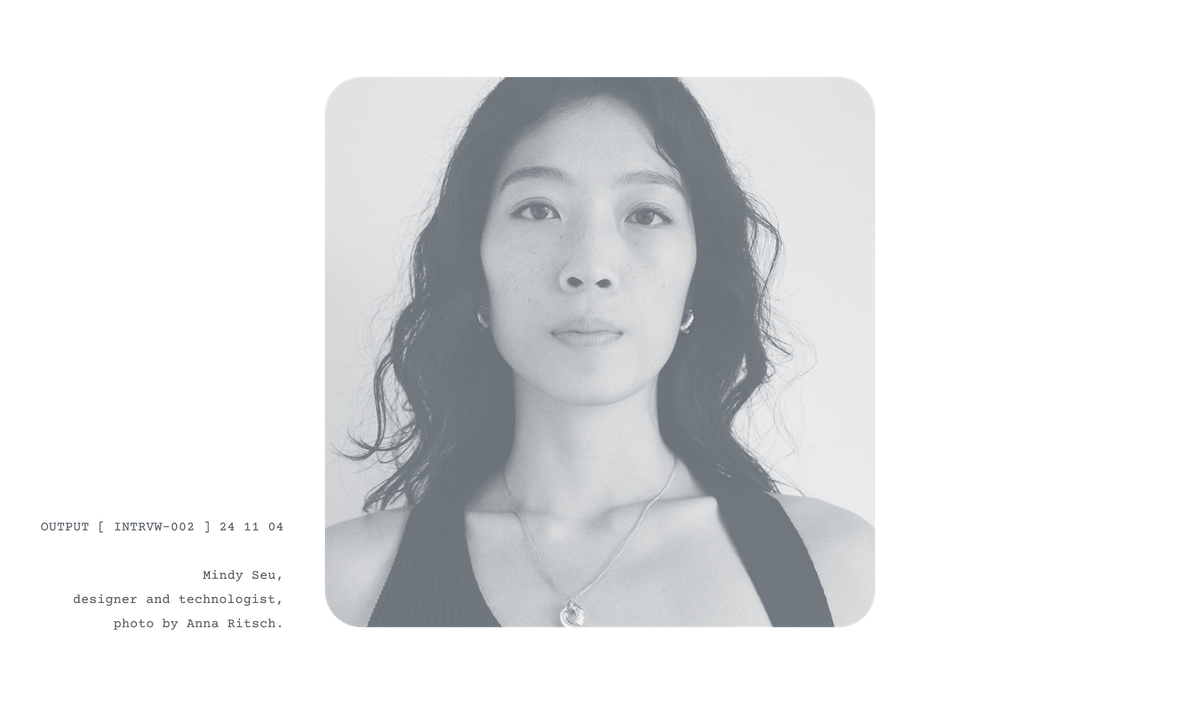Mindy Seu, Designer and Technologist

Mindy Seu is the author of the Cyberfeminism Index, a designer, a technologist and an educator, working across publishing, lecture performances and more.
APOSSIBLE™ is a non-profit bringing psychologists, technologists, artists and creatives together to explore how technology can better support creativity and human fulfillment. In this ongoing interview series we’re discovering what people value, what makes their lives fulfilling, and what kinds of relationships to technology they already cherish.
1. What is a ritual, practice, or routine in your life that is important for your psychological wellbeing and/or fulfillment? Why?
During my 20s, I never lived in an apartment longer than nine months. I constantly hopped from neighborhood to neighborhood, city to city, and learned to pack a capsule wardrobe and homey essentials into a carry-on suitcase.
For the past few years, I’ve been able to settle into an apartment in Brooklyn Heights, a couple blocks from the Promenade, a historic overlook on the edge of Brooklyn facing south and lower east edges of Manhattan. A few times a week, I’ll take a sunset walk on the Promenade down to Dumbo, and loop back towards Brooklyn Heights by tracing each of the five piers.
At a leisurely pace, this takes a bit over an hour. It feels like a lively port neighborhood, with glistening water, lush parks, and majestic skyline views. I’ve had a lot of revelations and healing during this walk. It has truly become one of my favorite parts of NYC.
2. What is a human-made creation that brings out the best in you? Why?
Conversation is one of the most important elements of my life. I've never been the kind of creative where an idea emerges from nowhere and I'm compelled to translate this into a physical form.
For me, those ideas always percolate through conversations with friends, going to lectures, unpacking something with my therapist, learning from students—these feel so energizing and this transfer of thoughts and ideas naturally becomes connected to what I’m listening to and reading and watching.
For an exhibition with AIR Gallery called Scalability Project, the curators Patricia M. Hernandez, Roxana Fabius, and I interviewed adrienne maree brown. We referred to the Audrey Lorde quote, “the Master’s tools will never dismantle the Master’s house.” We asked her what a pre-colonial tool might be, and she said that conversation is a human-made technology that existed long before these practices of subjugation. Whether it’s textual or verbal or interactions with the environment, these conversations can come in many forms and foreground community and group learning.
3. When do you cherish the slow or hard way of doing something? Why?
For my young adult life, I was a 5-year planner. Each year I had a long term plan that would serve as scaffolding for small decisions that I made now that would hopefully point to some larger goal of what I wanted in the future. But when I was in grad school I felt so much anxiety around not knowing what to do next. I still feel this at times.
I realized, though, that I could lean into emergence. I could experiment without pressure for it to build into something else, to be motivated by curiosity rather than external validation, to forgo terms like success or efficiency and instead focus on process and experimentation. Sometimes these do build into projects that feel publicly resonant and other times it feels like I’ve done something for myself that doesn’t need to be shared with the world.
This process is certainly slower than my past ways of working, and I think we should normalize things that take a long time.
4. What is something you appreciate or long for from the past? Why?
My late grandmother was an amazing cook. She would intuitively throw spices and sauces into a pan without measurements—a pinch of this, a splash of that—and it still yielded the same consistent nourishment that our family came to expect and cherish. Decades of domestic life meant that she could reach a calloused hand into a boiling pot of water to fish out some residue or easily pluck that random piece of produce from the yard that would serve as some sort of healing ointment.
My parents, concerned about assimilation, always spoke English to my sister and me while they spoke Korean to each other. So while I could understand Korean in a colloquial way, I never knew how to speak it. This meant that while my grandmother would say things to me, I had a lot of difficulty communicating back except through body language or unless my mother was there as a translator. As a young adult, I always wanted to make a family cookbook to document these recipes. When my grandmother was diagnosed with dementia several years ago, I don't know why I didn't feel more pressure to try to preserve those recipes. Her illness accelerated quickly and she was no longer able to improvise in the kitchen in that way that we witnessed as children.
To this day I wish that I had observed and noted her dishes. It feels like the most important heirloom that at this point is only captured as memories.
